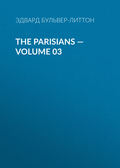
Эдвард Бульвер-Литтон
Zicci — Volume 02
CHAPTER XIII
We must go back to the preceding night. The actress and her nurse had returned from the theatre; and Isabel, fatigued and exhausted, had thrown herself on a sofa, while Gionetta busied herself with the long tresses which, released from the fillet that bound them, half concealed the form of the actress, like a veil of threads of gold; and while she smoothed the luxuriant locks, the old nurse ran gossiping on about the little events of the night,—the scandal and politics of the scenes and the tire-room.
The clock sounded the hour of midnight, and still Isabel detained the nurse; for a vague and foreboding fear, she could not account for, made her seek to protract the time of solitude and rest.
At length Gionetta's voice was swallowed up in successive yawns. She took her lamp and departed to her own room, which was placed in the upper story of the house. Isabel was alone. The half-hour after midnight sounded dull and distant, all was still, and she was about to enter her sleeping-room, when she heard the hoofs of a horse at full speed. The sound ceased; there was a knock at the door. Her heart beat violently; but fear gave way to another sentiment when she heard a voice, too well known, calling on her name. She went to the door.
"Open, Isabel,—it is Zicci," said the voice again.
And why did the actress feel fear no more, and why did that virgin hand unbar the door to admit, without a scruple or, a doubt, at that late hour, the visit of the fairest cavalier of Naples? I know not; but Zicci had become her destiny, and she obeyed the voice of her preserver as if it were the command of Fate.
Zicci entered with a light and hasty step. His horseman's cloak fitted tightly to his noble form, and the raven plumes of his broad hat threw a gloomy shade over his commanding features.
The girl followed him into the room, trembling and blushing deeply, and stood before him with the lamp she held shining upward on her cheek, and the long hair that fell like a shower of light over the bare shoulders and heaving bust.
"Isabel," said Zicci, in a voice that spoke deep emotion, "I am by thy side once more to save thee. Not a moment is to be lost. Thou must fly with me, or remain the victim of the Prince di —. I would have made the charge I now undertake another's,—thou knowest I would, thou knowest it; but he is not worthy of thee, the cold Englishman! I throw myself at thy feet; have trust in me, and fly."
He grasped her hand passionately as he dropped on his knee, and looked up into her face with his bright, beseeching eyes.
"Fly with thee!" said Isabel, tenderly.
"Thou knowest the penalty,—name, fame, honor, all will be sacrificed if thou dost not."
"Then, then," said the wild girl, falteringly, and turning aside her face, "then I am not indifferent to thee. Thou wouldest not give me to another; thou lovest me?"
Zicci was silent; but his breast heaved, his cheeks flushed, his eyes darted dark but impassioned fire.
"Speak!" exclaimed Isabel, in jealous suspicion of his silence. "Speak, if thou lovest me."
"I dare not tell thee so; I will not yet say I love thee."
"Then what matter my fate?" said Isabel, turning pale and shrinking from his side. "Leave me; I fear no danger. My life, and therefore my honor, is in mine own hands."
"Be not so mad!" said Zicci. "Hark! do you hear the neigh of my steed? It is an alarm that warns us of the approaching peril. Haste, or you are lost."
"Why do you care for me?" said the girl, bitterly. "Thou hast read my heart; thou knowest that I would fly with thee to the end of the world, if I were but sure of thy love; that all sacrifice of womanhood's repute were sweet to me, if regarded as the proof and seal of affection. But to be bound beneath the weight of a cold obligation; to be the beggar on the eyes of Indifference; to throw myself on one who loves me not,—that were indeed the vilest sin of my sex. Ah! Zicci, rather let me die."
She had thrown back her clustering hair from her face as she spoke; and as she now stood, with her arms drooping mournfully, and her hands clasped together with the proud bitterness of her wayward spirit, giving new zest and charm to her singular beauty, it was impossible to conceive a sight more irresistible to the senses and the heart.
"Tempt me not to thine own danger, perhaps destruction," exclaimed Zicci, in faltering accents; "thou canst not dream of what thou wouldest demand. Come," and, advancing, he wound his arm round her waist, "come, Isabel! Believe at least in my friendship, my protection—"
"And not thy love," said the Italian, turning on him her hurried and reproachful eyes. Those eyes met his, and he could not withdraw from the charm of their gaze. He felt her heart throbbing beneath his own; her breath came warm upon his cheek. He trembled,—he, the lofty, the mysterious Zicci,—who seemed to stand aloof from his race. With a deep and burning sigh he murmured, "Isabel, I love thee!" That beautiful face, bathed in blushes, drooped upon his bosom; and. as he bent down, his lips sought the rosy mouth,—a long and burning kiss. Danger, life, the world were forgotten! Suddenly Zicci tore himself from her.
"Oh! what have I said? It is gone,—my power to preserve thee, to guard thee, to foresee the storm in thy skies, is gone forever. No matter! Haste, haste; and may love supply the loss of prophecy and power!"
Isabel hesitated no more. She threw her mantle over her shoulders and gathered up her dishevelled hair; a moment, and she was prepared,—when a sudden crash was heard in the inner room.
"Too late!—fool that I was—too late!" cried Zicci, in a sharp tone of agony as he hurried to the outer door. He opened it, only to be borne back by the press of armed men.
Behind, before, escape was cut off. The room literally swarmed with the followers of the ravisher, masked, mailed, armed to the teeth.
Isabel was already in the grasp of two of the myrmidons; her shriek smote the ear of Zicci. He sprang forward, and Isabel heard his wild cry in a foreign tongue,—the gleam, the clash of swords. She lost her senses; and when she recovered, she found herself gagged, and in a carriage that was driven rapidly, by the side of a masked and motionless figure. The carriage stopped at the portals of a gloomy mansion. The gates opened noiselessly, a broad flight of steps, brilliantly illumined, was before her,—she was in the palace of the Prince di —.
CHAPTER XIV
The young actress was led to and left alone in a chamber adorned with all the luxurious and half-Eastern taste that at one time characterized the palaces of the great seigneurs of Italy. Her first thought was for Zicci,—was he yet living? Had he escaped unscathed the blades of the foe,—her new treasure, the new light of her life, her lord, at last her lover?
She had short time for reflection. She heard steps approaching the chamber; she drew back. She placed her hand on the dagger that at all hours she wore concealed in her bosom. Living or dead, she would be faithful still to Zicci There was a new motive to the preservation of honor. The door opened, and the Prince entered, in a dress that sparkled with jewels.
"Fair and cruel one," said he, advancing, with a half-sneer upon his lip, "thou wilt not too harshly blame the violence of love." He attempted to take her hand as he spoke.
"Nay," said he, as she recoiled, "reflect that thou art now in the power of one that never faltered in the pursuit of an object less dear to him than thou art. Thy lover, presumptuous though he be, is not by to save thee. Mine thou art; but instead of thy master, suffer me to be thy slave."
"My lord," said Isabel, with a stern gravity which perhaps the Stage had conspired with Nature, to bestow upon her, "your boast is in vain. Your power,—I am not in your power! Life and death are in my own hands. I will not defy, but I do not fear you. I feel—and in some feelings," added Isabel, with a, solemnity almost thrilling, "there is all the strength and all the divinity of knowledge—I feel that I am safe even here; but you, you, Prince di —, have brought danger to your home and hearth!"
The Neapolitan seemed startled by an earnestness and a boldness he was but little prepared for. He was not, however, a man easily intimidated or deterred from any purpose he had formed; and approaching Isabel, he was about to reply with much warmth, real or affected, when a, knock was heard at the door of the chamber. The sound was repeated, and the Prince, chafed at the interruption, opened the door and demanded impatiently who had ventured to disobey his orders and invade his leisure. Mascari presented himself, pale and agitated. "My lord," said he, in a whisper, "pardon me, but a stranger is below who insists on seeing you; and from some words he let fall, I judged it advisable even to infringe your commands."
"A stranger, and at this hour! What business can he pretend? Why was he even admitted?"
"He asserts that your life is in imminent danger. The source whence it proceeds he will relate to your Excellency alone."
The Prince frowned, but his color changed. He mused a moment, and then, re-entering the chamber and advancing towards Isabel, he said,—
"Believe me, fair creature, I have no wish to take advantage of my power. I would fain trust alone to the gentler authorities of affection. Hold yourself queen within these walls more absolutely than you have ever enacted that part on the stage. To-night, farewell! May your sleep becalm, and your dreams propitious to my hopes!"
With these words he retired, and in a few moments Isabel was surrounded by officious attendants, whom she at length, with some difficulty, dismissed; and refusing to retire to rest, she spent the night in examining the chamber, which she found was secured, and in thoughts of Zicci, in whose power she felt an almost preternatural confidence.
Meanwhile the Prince descended the stairs, and sought the room into which the stranger had been shown.
He found him wrapped from head to foot in a long robe,—half gown, half mantle,—such as was sometimes worn by ecclesiastics. The face of this stranger was remarkable; so sunburnt and swarthy were his hues that he must, apparently, have derived his origin amongst the races of the farthest East. His—forehead was lofty, and his eyes so penetrating, yet so calm, in their gaze that the Prince shrank from them as we shrink from a questioner who is drawing forth the guiltiest secrets of our hearts.
"What would you with me?" asked the Prince, motioning his visitor to a seat.
"Prince di —," said the stranger, in a voice deep and sweet, but foreign in its accent, "son of the most energetic and masculine race that ever applied godlike genius to the service of the Human Will, with its winding wickedness and its stubborn grandeur; descendant of the great Visconti, in whose chronicles lies the History of Italy in her palmy day, and in whose rise was the development of the mightiest intellect ripened by the most relentless ambition,—I come to gaze upon the last star in a darkening firmament. By this hour to-morrow space shall know it not. Man, thy days are cumbered!"
"What means this jargon?" said the Prince, in visible astonishment and secret awe. "Comest thou to menace me in my own halls, or wouldest thou warn me of a danger? Art thou some itinerant mountebank, or some unguessed of friend? Speak out, and plainly. What danger threatens me?"
"Zicci!" replied the stranger.
"Ha! ha!" said the Prince, laughing scornfully; "I half suspected thee from the first. Thou art, then, the accomplice or the tool of that most dexterous, but, at present, defeated charlatan. And I suppose thou wilt tell me that if I were to release a certain captive I have made, the danger would vanish and the hand of the dial would be put back?"
"Judge of me as thou wilt, Prince di —. I confess my knowledge of Zicci,—a knowledge shared but by a few, who—But this touches thee not. I would save, therefore I warn thee. Dost thou ask me why? I will tell thee. Canst thou remember to have heard wild tales of thy grandsire,— of his desire for a knowledge that passes that of the schools and cloisters; of a strange man from the East, who was his familiar and master in lore, against which the Vatican has from age to age launched its mimic thunder? Dost thou call to mind the fortunes of thy ancestor,—how he succeeded in youth to little but a name; how, after a career wild and dissolute as thine, he disappeared from Milan, a pauper and a self-exile; how, after years spent none knew in what climes or in what pursuits, he again revisited the city where his progenitors had reigned; how with him came this wise man of the East, the mystic Mejnour; how they who beheld him, beheld with amaze and fear that time had ploughed no furrow on his brow,—that youth seemed fixed as by a spell upon his face and form? Dost thou know that from that hour his fortunes rose? Kinsmen the most remote died, estate upon estate fell into the hands of the ruined noble. He allied himself with the royalty of Austria, he became the guide of princes, the first magnate of Italy. He founded anew the house of which thou art the last lineal upholder, and transferred its splendor from Milan to the Sicilian realms. Visions of high ambition were then present with him nightly and daily. Had he lived, Italy would have known a new dynasty, and the Visconti would have reigned over Magna Graecia. He was a man such as the world rarely sees; he was worthy to be of us, worthy to be the pupil of Mejnour,—whom you now see before you."
The Prince, who had listened with deep and breathless attention to the words of his singular guest, started from his seat at his last words. "Impostor!" he cried, "can you dare thus to play with my credulity? Sixty years have passed since my grandsire died; and you, a man younger apparently than myself, have the assurance to pretend to have been his contemporary! But you have imperfectly learned your tale. You know not, it seems, that my grandsire—wise and illustrious, indeed, in all save his faith in a charlatan—was found dead in his bed in the very hour when his colossal plans were ripe for execution, and that Mejnour was guilty of his murder?"
"Alas!" answered the stranger, in a voice of great sadness, had he but listened to Mejnour, had he delayed the last and most perilous ordeal of daring wisdom until the requisite training and initiation had been completed, your ancestor would have stood with me upon an eminence which the waters of Death itself wash everlastingly, but cannot overflow. Your grandsire resisted my fervent prayers, disobeyed my most absolute commands, and in the sublime rashness of a soul that panted for the last secrets, perished,—the victim of his own frenzy."
"He was poisoned, and Mejnour fled."
"Mejnour fled not," answered the stranger, quickly and proudly.
"Mejnour could not fly from danger, for to him danger is a thing long left behind. It was the day before the duke took the fatal draught which he believed was to confer on the mortal the immortal boon that, finding my power over him was gone, I abandoned him to his doom.
"On the night on which your grandsire breathed his last, I was standing alone at moonlight on the ruins of Persepolis,—for my wanderings, space hath no obstacle. But a truce with this: I loved your grandsire; I would save the last of his race. Oppose not thyself to Zicci. Oppose not thyself to thine evil passions. Draw back from the precipice while there is yet time. In thy front and in thine eyes I detect some of that diviner glory which belonged to thy race. Thou hast in thee some germs of their hereditary genius, but they are choked up by worse than thy hereditary vices. Recollect, by genius thy house rose,— by vice it ever failed to perpetuate its power. In the laws which regulate the Universe it is decreed that nothing wicked can long endure. Be wise, and let history warn thee. Thou standest on the verge of two worlds,—the Past and the Future; and voices from either shriek omen in thy ear. I have done. I bid thee farewell."
"Not so; thou shalt not quit these walls. I will make experiment of thy boasted power. What ho there! ho!" The Prince shouted; the room was filled with his minions. "Seize that man!" he cried, pointing to the spot which had been filled by the form of Mejnour. To his inconceivable amaze and horror, the spot was vacant. The mysterious stranger had vanished like a dream.







